- Home
- Alison Booth
The Indigo Sky Page 6
The Indigo Sky Read online
Page 6
At this point Jim began to wonder if he’d been unkind to his father the day before. It was true that he’d been annoyed with him and hadn’t bothered to disguise it. And it wasn’t only because Andy hadn’t been offered a trip to Sydney. Being honest with himself, Jim could admit now that he’d been shocked at how shabby his father had seemed in that shiny black suit. Having catalogued the failures of yesterday, Jim next began to wonder if his father might be lost. Unused to making his way around the city, he could have ended up anywhere. Maybe he’d got on the wrong bus or even been mugged. His father had taken three days off work to come to the Speech Day and he deserved better treatment than what his son had doled out to him. Shabby his father undoubtedly was, but Jim’s conduct had been a good deal shabbier. Dad was a better man by far than most of the other adults Jim had come across. He was someone to be proud of, not ashamed of.
Just as he’d arrived at this conclusion – with only five minutes before the train was due to leave – he felt a light tap on his shoulder. His father stood there, puce in the face and panting. ‘So much traffic,’ he gasped. ‘I didn’t imagine the bus would take so long.’
‘Thank God you’re here, Dad. We’ve got to hurry.’ Jim grabbed his father’s case as well as his own and sprinted towards the platform.
Once they were settled in their carriage, the train began to puff out of the terminus. His father immediately shut his eyes. Although exhausted, Jim didn’t follow his example. Instead he inspected his father. He was out of that terrible suit, thank God, and with some surprise Jim noticed for the first time that he was rather handsome, in spite of the slightly sagging cheeks. Skin as olive as Jim’s own, but meshed around the eyes with fine lines. Even in repose, one of his eyebrows was slightly raised. In the space of just one term, his hair had receded further. Why this discovery should so abruptly fill Jim with tenderness he didn’t understand. Quickly he looked away.
Once they’d terminated at Bomaderry some hours later and transferred onto the bus to Burford, Jim began to feel as if he was almost home. He knew this was an illusion though. There were still many miles to travel. Through tall forests, past dairy farms, down the main streets of little towns whose names he could run through in his head like an invocation. Next, the changing vegetation that would indicate they were almost in Wilba Wilba Shire. The tall straight trunks of eucalyptus trees, dappled white and grey, and the cycads growing between them.
He couldn’t wait to get home.
Yet within two months he knew that he’d be looking forward to returning to Sydney. There was only so much you could do at Jingera, but you could always take away part of it in your head.
Chapter 8
‘W-w-what d-d-d-did you th-think of m-m-my l-l-letter?’
Ever since school had broken up three days ago, Philip had been hoping to get his father alone and only now had it proved possible. Side-by-side, they stood on a jetty at Circular Quay waiting for the ferry that would take them to the Valencia Street Wharf at Hunters Hill. They were to visit his father’s sister, Auntie Susan, and her husband Uncle Fred, for afternoon tea. Mummy had pleaded a headache and they’d left her lying, with a cold compress over her eyes, in a darkened room of their suite at the Hotel Australia. The warm air now seemed to be pressing down on Philip like a light blanket. Seagulls wailed and ferries hooted, and still his father hadn’t answered his question. The heaving of the jade green harbour water was starting to make him feel a bit queasy, or it could have been the thought of what else he wanted to tell his father.
For the past two days his parents had become inseparable as they never were at home. Philip might normally have been content to be alone in his room, instead of in a dormitory with eleven other boys, had he not been so eager to talk to his father about leaving Stambroke. He couldn’t stay on there; this much was clear. He couldn’t stand another term of that anxiety, that waiting for one of the gang to persecute him. Head down the toilet bowl because his hair looked like it needed a good shampoo, or at least that’s what Keith Macready had said. Later that fuss about the boot polish on the toilet seat that had got itself all over his shorts.
If it hadn’t been for Giles Mellor, he might have run away before the end of term, but the trouble was that he didn’t know where to run. He had little idea of the geography of Sydney. He’d always travelled to and from school by car and never taken much notice of the roads, which seemed to wind around in a very confusing way. You couldn’t live in ignorance all your life though. After term ended and they’d checked into the Hotel Australia for a week, he’d made a point of finding a map of Sydney. The layout of the city was much clearer once you understood that the road system was set by the shape of the harbour.
His father seemed to have forgotten his question, so he repeated it. ‘W-w-what d-d-did y-you think of m-m-my l-l-letter?’
‘A nice letter. The spelling was perfect.’ His father didn’t look at him though, he just carried on staring towards the Harbour Bridge as if he was willing a ferry to appear. ‘Good, here it is at last. You’ve got to remember, Philip, that education’s everything these days. I know you’re homesick at Stambroke, but it’s all for your own good.’
How having his head shoved into the toilet bowl could be for his own good, Philip had no idea. He started to try to explain the bullying but the words refused to form themselves, let alone emerge from his mouth in a sentence that his father could understand.
‘Don’t get so het up, son,’ his father said, putting an arm around Philip’s shoulders in a gesture that might have reduced him to tears if he hadn’t been so intent on getting his message across. ‘I’m not quite sure what you’re saying but one thing’s clear. You’ve got to learn how to stand up for yourself and be a man.’
At this moment, the ferry pulled into the wharf. Two men jumped onto the jetty. After slinging thick ropes around metal bollards, they began to guide the passengers onto a rather rickety looking wooden walkway. It was impossible to talk further until they were on board.
‘Th-th-they p-p-p-pick on me,’ Philip said after they’d found a seat. He tried to explain what happened each night but it proved impossible, the words deserted him.
Some moments passed by before his father said, ‘I know teasing goes on at school but it passes. Once you get a bit bigger they won’t pick on you anymore. Hang about with your own group of friends. You’ve got to learn to stick up for yourself in life and this is as good a training as any. Stambroke’ll teach you to defend yourself, just as it did me. My days there were some of the happiest of my life.’
Philip watched the light sparkling off the water. It made his eyes hurt. If only he could speak properly. If only he could describe the things that happened, night after night, and the endless anxiety that kept him awake. But he said no more, fearing that tears would come and this would make his father think even less of him than he did already. Anyway, revealing what had happened might make his father think he was a weakling who needed much more time at boarding school to build his character.
So upset did Philip feel that he couldn’t take in what he was seeing from the ferry. Already the holidays were ruined with the thought of having to return to Stambroke College at the end. He barely noticed getting off the boat, or the tree-lined street they walked up to reach his aunt and uncle’s house.
But Auntie Susan, waiting at the front gate of one of the sandstone houses, was smiling so broadly it was impossible not to smile back. It was a year since he’d last seen her; she was browner than he’d remembered and her eyes a brighter blue. In spite of being sister and brother, she and his father were different colours. His father’s face was probably so red because of all the outdoor work he did. To distract himself while they talked about something dull, Philip wondered what his own brother or sister might have looked like if he hadn’t been an only child. Maybe they’d be fair like him. His father had been fair-haired once, before he went white, but his mother’s
hair remained remarkably red in spite of the passage of time.
Auntie Susan was much older though. Her husband, Fred, waiting on the front verandah, was older still, although not retired yet; he was a solicitor somewhere in the city. Tall and thin, he wore square glasses and hair arranged in strands across his shining scalp. He shook Philip’s hand as well as his father’s, and asked after the young man. It was only a prompt from his father that made Philip realise that he was the person in question.
Fortunately his relatives seemed content to let him sit in silence during afternoon tea. They were absorbed in talking about the Prime Minister, Mr Menzies, who yesterday had narrowly defeated Mr Calwell in some battle to run the country. While their words swirled around him, he took in very little of what they said. He ate nothing either, while he struggled against the feelings of hopelessness that his father’s comments had induced. This is as good a training as any. You’ve got to learn how to stand up for yourself. You’ve got to be a man. Wistfully he stared at the open piano in the far corner of the living room. If it were in another room he could ask to play it, and that would distract him.
When at last they were about to leave, his aunt showed him a music score. ‘This is for you. It’s a sonatina for the piano. I know you love to play and I thought you mightn’t have come across this. It’s by an Australian composer called Sculthorpe.’
He looked at his aunt properly for only the second time this visit. She had such a kind face, with those clear blue eyes that seemed to stare right into you. ‘Th-th-thanks,’ he said, and next surprised himself by managing to add, with only the tiniest stammer, ‘It’s v-v-very th-thoughtful of y-y-you.’
She put the sheets of music into a manila envelope and handed it to him. ‘Come and see us any time,’ she said. ‘You know where we are. I’m sorry we couldn’t invite you here for a free weekend last term but we only got back from London a few weeks ago. Next term you must definitely come to us.’ She leant forward and kissed his cheek.
Philip and his father walked to the Valencia Street Wharf without exchanging a word. After boarding the ferry, they sat on a slatted wooden seat at the back of the boat. The sky that had earlier been a brilliant blue had become suffused with a strange yellow light. Staring at the harbour water, which was now dark green and choppy, Philip began for the first time to question his father. Only inwardly, naturally. He’d never have the courage to challenge him openly, or be able to mouth the words.
By the time the ferry reached Circular Quay and his father had finished reading his newspaper, Philip had decided on a new tack. He would work on his mother instead. Not while they were in Sydney, she wasn’t herself here, but after they went home to Woodlands. Maybe there she’d have the patience to listen to him. Though he knew she probably wouldn’t, not unless he could think of some novel way of getting her attention.
In the meantime he wouldn’t talk about his unhappiness to his father. He wouldn’t talk about anything with his father. They disembarked, still in silence, under a sky that was now bruised-looking. After hurrying up George Street, they arrived at the hotel just as the first fat raindrops started to fall.
Chapter 9
Zidra had been meaning to find out about newspaper cadetships for weeks but there never seemed to be an appropriate time, what with leaving for school so early and returning so late. A few days before term ended, she took a day off school. These days her mother was very good about providing a note for the odd day’s absence, even when Zidra wasn’t ill. Sometimes one needs a sickie, she would say, to allow one to put things into perspective. The notes to the form teacher were no problem for her. ‘Zidra was indisposed,’ she might write, ‘but after a day’s bed rest she has been sufficiently restored to return to the fray.’
Zidra had spent part of this morning reading in bed. Tiring of this, she’d taken the box of combs and brushes out to the paddock where her chestnut horse was grazing. Although Star seemed surprised by her appearance several hours before midday when she should have been at school – his sense of the passage of the days was as sophisticated as any human being’s, Zidra told him – he’d seemed to enjoy the extra grooming as much as she. Afterwards she’d saddled him up and they’d galloped to the far side of the property and back. By the early afternoon she was ready to begin writing a history essay but when she heard the back door slam shut and soon after her parents’ voices outside, she peered out of her attic window. Good, they were heading towards the dam. Now was the opportunity she’d been waiting for to phone Sydney without her mother breathing down her neck.
She retrieved several back copies of the Sydney Morning Chronicle that were kept on a shelf in the dresser in the kitchen. After taking them into the hallway, she dumped them on the floor next to the telephone table. Quickly she began to sort through the papers, resisting the temptation to read interesting-looking articles. Instead she checked the names of the editorial team. They were all men, except for the editor of the social pages. Flicking through these, she saw photographs of ladies lunching, photographs of smiling couples at exhibitions and race meetings, and read the glib text underneath each photo. Mr and Mrs Simon Blythe at the races. Mrs John Symonds and Mrs Peter Wenborn at the new opening at the Hoffman Galleries. Miss Ruth Paton, 18, and Miss Vanessa Bowen, 17, spotted lunching at Vivaldi’s. Zidra scanned the gossip column, idle chitchat of no interest apart from to those whose names were mentioned. There was shipping news too: who was arriving at Sydney Harbour on what ship, who was departing on what other ship. As if anyone cared.
Next Zidra gave the operator the telephone number of the newspaper. For a moment she wondered if Mrs McGrath from Loganbrae next door – it was a party line – was listening in, but she didn’t care. She got through and asked to speak to the social editor.
To her surprise, she was immediately connected. Once the preliminaries were over, she said, ‘I want to be a journalist. How do I become one?’
‘I got started with an arts degree from Sydney University.’ The woman’s voice was friendly.
‘How do you get off the social pages?’
There was a loud laughter. ‘My dear, if you’re a woman you never get off the social pages.’
‘Do you have internships on the paper?’
‘There are cadetships. How old are you?’
‘Fourteen.’
‘Try calling back again in a few years time, darl, and we can discuss the matter further.’
Zidra put down the receiver and sat cross-legged on the floor. If you’re female you never get off the social pages. Surely it couldn’t be the case that being a woman disbarred you from proper journalism. That was old-fashioned, like the marriage bar. She wouldn’t be deterred though. She wrote well and she wrote quickly. Mrs Fox the English teacher had told her that these were just the skills needed in journalism, and she’d know, her husband was editor of the Burford Advertiser. Zidra began to examine the pages of the newspaper more closely. While many of the articles had no names on them, some did. They were all male but one, Felicity Butler. If Butler could do it, so could she. Again she gave the operator the Sydney Morning Chronicle number and this time asked to be connected to Felicity Butler.
‘Sorry, love, she’s just gone overseas,’ the switchboard operator said.
‘Is she the foreign editor?’
‘No, she was a politics writer but she’s actually left the paper. Got a job at the Daily Courier in London.’
This discovery gave Zidra fresh hope. A transition from Sydney to London seemed even more interesting than from Jingera to Sydney. After hanging up, she glanced at her reflection in the oval mirror above the telephone table. The caption to this picture was easy. Miss Zidra Vincent, 14, caught relaxing at Ferndale, decides that she will see the world.
A degree from Sydney University, she decided, that would be the way into journalism. Or from any university; it was hard to get into Sydney, Jim had told her. Her t
est results had improved dramatically lately, though. Making good progress academically, the last school report had said. That she had a talent for algebra and geography had come as a bit of a surprise. Chemistry remained a closed book, however; there was something about the periodic tables and compounds that put her to sleep. Her conduct reports weren’t up to much though, and she knew they never would be. Cheeky. Inclined to answer back. Shouldn’t loiter in the corridors between classes. Inclined to lead others into mischief.
The reason for the improvement in her grades Zidra had kept to herself. The truth was that she was frightened. Frightened that nothing would ever happen in her life. That the days would continue to pass by endlessly without event. There was always that same old routine: getting up early in the morning, waiting at the gateway for the school bus, all day at school, afterwards home again and, if she were lucky, time to groom and ride Star for half an hour. It sometimes seemed that she was always waiting for something profound to occur, but nothing ever did.
Over the months she became convinced that she would have to get away. Not yet, not until she’d finished school. The only route out of here was to obtain a place at university. Once she’d realised this, she began to work harder at school. After a few months she’d seen, not that much was possible, but rather that something was possible.
Over dinner that night, her parents began to discuss the election results. This led, after some minutes, to Zidra’s father saying, ‘The papers publish a lot of lies. Whatever’s released to them by the government they publish, as if it’s the truth instead of some fiction.’
‘That’s a bit harsh, Peter. At least there is an opposition.’
‘There was one in the McCarthy era too in the United States. But anybody could be denounced as un-American and no verification was required, or none to speak of. The opposition there didn’t stop any of that erosion of civil liberties.’

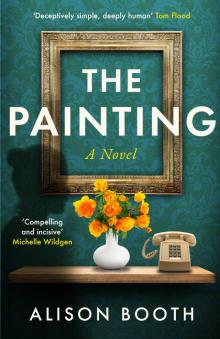 The Painting
The Painting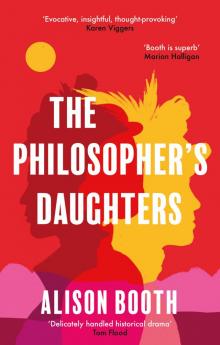 The Philosopher's Daughters
The Philosopher's Daughters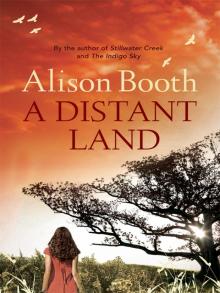 A Distant Land
A Distant Land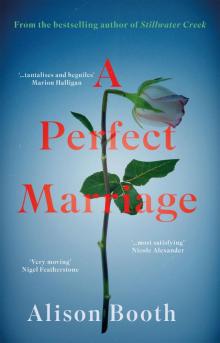 A Perfect Marriage
A Perfect Marriage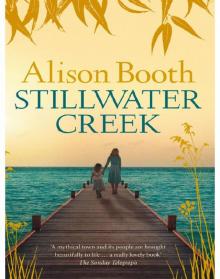 Stillwater Creek
Stillwater Creek The Indigo Sky
The Indigo Sky